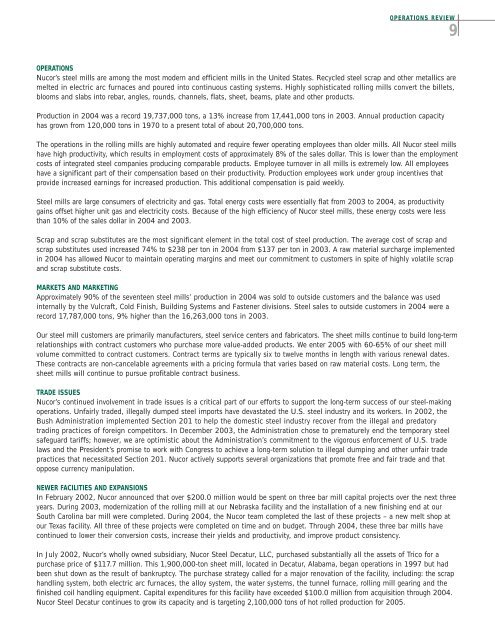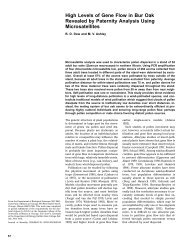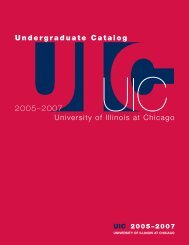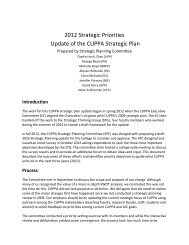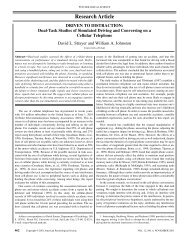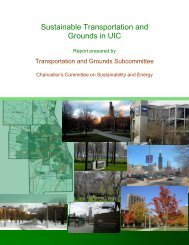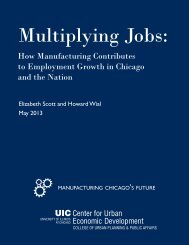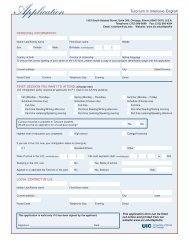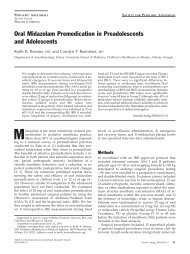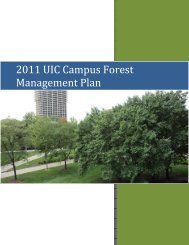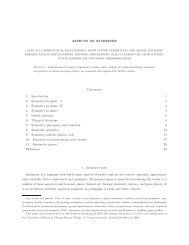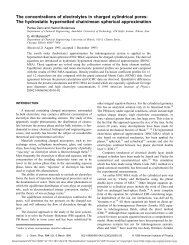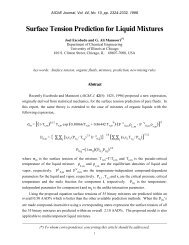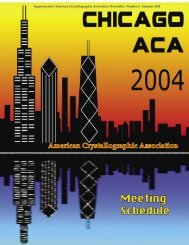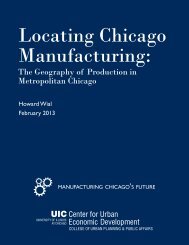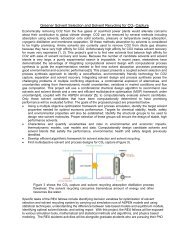2004 ANNUAL REPORT
2004 ANNUAL REPORT
2004 ANNUAL REPORT
- TAGS
- annual
- www.uic.edu
You also want an ePaper? Increase the reach of your titles
YUMPU automatically turns print PDFs into web optimized ePapers that Google loves.
OPERATIONS REVIEW<br />
9<br />
OPERATIONS<br />
Nucor’s steel mills are among the most modern and efficient mills in the United States. Recycled steel scrap and other metallics are<br />
melted in electric arc furnaces and poured into continuous casting systems. Highly sophisticated rolling mills convert the billets,<br />
blooms and slabs into rebar, angles, rounds, channels, flats, sheet, beams, plate and other products.<br />
Production in <strong>2004</strong> was a record 19,737,000 tons, a 13% increase from 17,441,000 tons in 2003. Annual production capacity<br />
has grown from 120,000 tons in 1970 to a present total of about 20,700,000 tons.<br />
The operations in the rolling mills are highly automated and require fewer operating employees than older mills. All Nucor steel mills<br />
have high productivity, which results in employment costs of approximately 8% of the sales dollar. This is lower than the employment<br />
costs of integrated steel companies producing comparable products. Employee turnover in all mills is extremely low. All employees<br />
have a significant part of their compensation based on their productivity. Production employees work under group incentives that<br />
provide increased earnings for increased production. This additional compensation is paid weekly.<br />
Steel mills are large consumers of electricity and gas. Total energy costs were essentially flat from 2003 to <strong>2004</strong>, as productivity<br />
gains offset higher unit gas and electricity costs. Because of the high efficiency of Nucor steel mills, these energy costs were less<br />
than 10% of the sales dollar in <strong>2004</strong> and 2003.<br />
Scrap and scrap substitutes are the most significant element in the total cost of steel production. The average cost of scrap and<br />
scrap substitutes used increased 74% to $238 per ton in <strong>2004</strong> from $137 per ton in 2003. A raw material surcharge implemented<br />
in <strong>2004</strong> has allowed Nucor to maintain operating margins and meet our commitment to customers in spite of highly volatile scrap<br />
and scrap substitute costs.<br />
MARKETS AND MARKETING<br />
Approximately 90% of the seventeen steel mills’ production in <strong>2004</strong> was sold to outside customers and the balance was used<br />
internally by the Vulcraft, Cold Finish, Building Systems and Fastener divisions. Steel sales to outside customers in <strong>2004</strong> were a<br />
record 17,787,000 tons, 9% higher than the 16,263,000 tons in 2003.<br />
Our steel mill customers are primarily manufacturers, steel service centers and fabricators. The sheet mills continue to build long-term<br />
relationships with contract customers who purchase more value-added products. We enter 2005 with 60-65% of our sheet mill<br />
volume committed to contract customers. Contract terms are typically six to twelve months in length with various renewal dates.<br />
These contracts are non-cancelable agreements with a pricing formula that varies based on raw material costs. Long term, the<br />
sheet mills will continue to pursue profitable contract business.<br />
TRADE ISSUES<br />
Nucor’s continued involvement in trade issues is a critical part of our efforts to support the long-term success of our steel-making<br />
operations. Unfairly traded, illegally dumped steel imports have devastated the U.S. steel industry and its workers. In 2002, the<br />
Bush Administration implemented Section 201 to help the domestic steel industry recover from the illegal and predatory<br />
trading practices of foreign competitors. In December 2003, the Administration chose to prematurely end the temporary steel<br />
safeguard tariffs; however, we are optimistic about the Administration’s commitment to the vigorous enforcement of U.S. trade<br />
laws and the President’s promise to work with Congress to achieve a long-term solution to illegal dumping and other unfair trade<br />
practices that necessitated Section 201. Nucor actively supports several organizations that promote free and fair trade and that<br />
oppose currency manipulation.<br />
NEWER FACILITIES AND EXPANSIONS<br />
In February 2002, Nucor announced that over $200.0 million would be spent on three bar mill capital projects over the next three<br />
years. During 2003, modernization of the rolling mill at our Nebraska facility and the installation of a new finishing end at our<br />
South Carolina bar mill were completed. During <strong>2004</strong>, the Nucor team completed the last of these projects – a new melt shop at<br />
our Texas facility. All three of these projects were completed on time and on budget. Through <strong>2004</strong>, these three bar mills have<br />
continued to lower their conversion costs, increase their yields and productivity, and improve product consistency.<br />
In July 2002, Nucor’s wholly owned subsidiary, Nucor Steel Decatur, LLC, purchased substantially all the assets of Trico for a<br />
purchase price of $117.7 million. This 1,900,000-ton sheet mill, located in Decatur, Alabama, began operations in 1997 but had<br />
been shut down as the result of bankruptcy. The purchase strategy called for a major renovation of the facility, including: the scrap<br />
handling system, both electric arc furnaces, the alloy system, the water systems, the tunnel furnace, rolling mill gearing and the<br />
finished coil handling equipment. Capital expenditures for this facility have exceeded $100.0 million from acquisition through <strong>2004</strong>.<br />
Nucor Steel Decatur continues to grow its capacity and is targeting 2,100,000 tons of hot rolled production for 2005.


